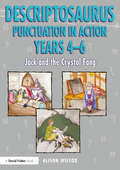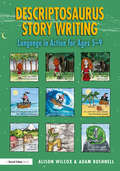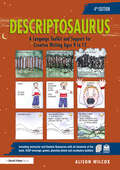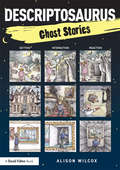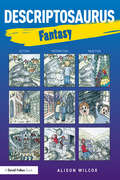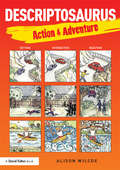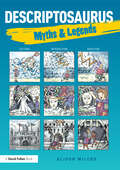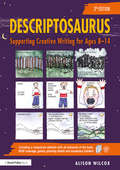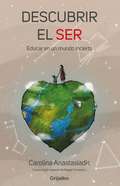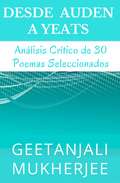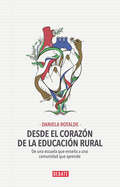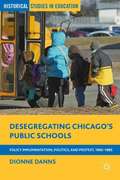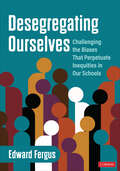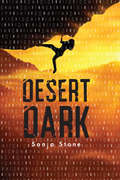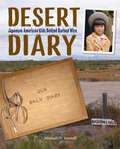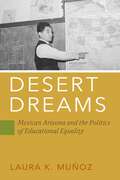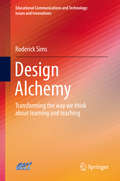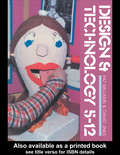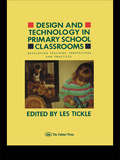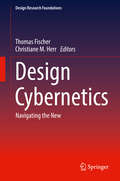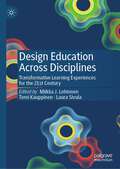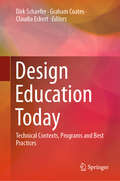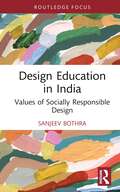- Table View
- List View
Descriptosaurus Punctuation in Action Years 4-6: Jack and the Crystal Fang
by Alison WilcoxThe only cure for a deadly plague sweeping the country is the crystal fang of a dragon that has terrorised the surrounding countryside for many years. Until now, the location of its den on Dragon Ridge Mountain has remained a mystery. In a race against time, Jack battles through a storm to reach the top of Dragon Ridge Mountain. With Merlin to guide him, Jack enters the dragon’s den and comes face to face with the monstrous beast. This is a story of courage, magic and one boy’s brave quest to fulfil a destiny foretold by the legends of long ago.Join Jack on his journey as he writes the story with the assistance of the magician Merlin and Punctua, the Fairy Godmother of Writing, to punctuate properly and become a bestselling author.Descriptosaurus Punctuation in Action Years 4–6: Jack and the Crystal Fang is part of a short series of age-specific, beautifully illustrated stories that can be read for pleasure and/or used as a contextualised resource, containing a step-by-step guide to teaching punctuation. The characters from each story are used to demonstrate a range of punctuation rules in a fun and engaging way appropriate to the book’s age group. Areas covered include: formulating punctuation rules. the use of misconceptions to highlight common errors. teaching tips to provide a punctuation model. The book explores the impact of punctuation on reading, understanding, meaning and effect, and can be used as a basis for pupils’ own punctuation or included in their ‘Writer’s Toolkit.’ These new Descriptosaurus stories are an indispensable teaching aid for making punctuation fun for all primary teachers and literacy coordinators.
Descriptosaurus Story Writing: Language in Action for Ages 5–9
by Alison Wilcox Adam BushnellDescriptosaurus Story Writing provides a resource for younger pupils that will not only expand their descriptive vocabulary but also provide them with models that demonstrate ‘language in action,’ in a genre that is popular and familiar to children aged 5–9. Providing the essential building blocks to create a narrative text, alongside contexualised banks of vocabulary, phrases and sentence types, this book is designed to provide young pupils with the opportunity to see how a text is constructed using words, phrases and sentences. This exciting new resource: Provides vocabulary for setting, character, ‘show not tell’ and sensory descriptions with clearly defined progression Demonstrates how to use this vocabulary in different contexts using set sentence structures Offers four model narratives written in different styles and level of difficulty Presents modelled sentences with exercises so that pupils can expand their vocabulary Enables young pupils to develop their understanding of how sentences are constructed and become more confident about using these skills in their own story writing. This is an ideal resource to dramatically improve children’s knowledge and understanding of language, grammar and punctuation for all KS1 and KS2 primary English teachers, literacy coordinators and parents. This easily accessible guide will also be helpful for teachers to use in preparation for Spelling, Punctuation and Grammar (SPAG) alongside a creative writing task.
Descriptosaurus: A Language Toolkit and Support for Creative Writing Ages 9 to 12
by Alison WilcoxNow in its fully updated fourth edition, the bestselling Descriptosaurus is the first book for creative writing that is a thematic expansion of a dictionary and a thesaurus; it provides students with a language toolkit with which to expand their descriptive vocabulary, experiment with language and sentence structure and build up narratives based around settings, characters and creatures. Descriptosaurus positions the word, zooms in on it to examine the meaning, expands it into phrases, and then provides alternatives in words, phrases and sentences; the model was created and refined over a number of years as a result of feedback from students inside and outside the classroom as to the resources they required to inspire and assist them with their writing. For reluctant writers or those faced with blank page syndrome, it provides essential starting points to encourage putting pen to paper, not only inspiring students, but also building their confidence, encouraging them to use, apply and create using the correct grammatical structures, and adding colour to their writing through evaluation and experimentation. New features for this expanded edition include: - Additional vocabulary, including technical vocabulary for non-fiction topics such as volcanoes, mountains and caves - An additional chapter to cover the popular primary topic of cold climates and polar exploration - How to use word clines to expand vocabulary and explore shades of meaning - Guidelines, resources and models to scaffold learning about grammar - Sentences that have been expanded and reworked to provide modelled sentences for DFI (Detail, Flow and Impact) - Guidelines, resources, exercises and models to support the teaching of sentence construction using imitation, combining and expansion techniques Accompanied by Instructor and Student Resources containing all the games, planning sheets and vocabulary builders from the book, this is an ideal resource to dramatically improve students' creative writing, confidence and facility with sentence construction for all primary and secondary English teachers, literacy coordinators and parents. It would also make an excellent classroom book for PGCE students, particularly Primary PGCE with English specialism.
Descriptosaurus: Genres: Action And Adventure
by Alison WilcoxDescriptosaurus: Ghost Stories builds on the vocabulary and descriptive phrases introduced in the original bestselling Descriptosaurus and, within the context of ghost stories, develops the structure and use of the words and phrases to promote colourful cinematic writing. This essential guide will enable children to take their writing to the next level, combine their descriptions of setting and character and show how the two interact. Children can then experiment with their own ghost stories, armed with the skills, techniques and vocabulary necessary to describe their ghostly scenes in a way that allows the reader to feel the characters’ fear and visualise the source of their terror within the setting. This new system also provides a contextualised alternative to grammar textbooks and will assist children in acquiring, understanding and applying the grammar they will need to improve their writing, both creative and technical.
Descriptosaurus: Genres: Action And Adventure
by Alison WilcoxDescriptosaurus: Fantasy builds on the vocabulary and descriptive phrases introduced in the original bestselling Descriptosaurus and within the context of fantasy develops the structure and use of the words and phrases to promote colourful, cinematic writing. This essential guide will enable children to take their writing to the next level. It incorporates the essential skills and creative devices that are used in other genres while extending to themes of battle, sieges, magic and mystery to unleash children’s imaginations. This new system also provides a contextualised alternative to textbook grammar and will assist children in acquiring, understanding and applying the grammar required to improve their writing, both creative and technical.
Descriptosaurus: Genres: Action And Adventure
by Alison WilcoxDescriptosaurus: Action & Adventure builds on the vocabulary and descriptive phrases introduced in the original bestselling Descriptosaurus and, within the context of adventure stories, develops the structure and use of the words and phrases to promote colourful cinematic writing. This essential guide will enable children to take their writing to the next level, combine their descriptions of setting and character and show how the two interact. Children can then experiment with their own adventure stories, armed with the skills, techniques and vocabulary necessary to describe their action scenes in a way that allows the reader to feel the characters’ fear and excitement, and visualise the action within the setting. This new system also provides a contextualised alternative to grammar textbooks and will assist children in acquiring, understanding and applying the grammar they will need to improve their writing, both creative and technical.
Descriptosaurus: Myths And Legends
by Alison WilcoxDescriptosaurus: Myths & Legends builds on the vocabulary and descriptive phrases introduced in the original bestselling Descriptosaurus and, within the context of myths and legends, develops the structure and use of the words and phrases to promote colourful cinematic writing. This essential guide will enable children to take their writing to the next level, combine their descriptions of setting and character and show how the two interact. Children can then experiment with heroes, gods and supernatural beings to create a legendary story. This new system also provides a contextualised alternative to grammar textbooks and will assist children in acquiring, understanding and applying the grammar they will need to improve their writing, both creative and technical.
Descriptosaurus: Supporting Creative Writing for Ages 8–14
by Alison WilcoxNow in a fully updated third edition, Descriptosaurus is the first book for creative writing that is a thematic expansion of a dictionary and a thesaurus; it provides children with a comprehensive resource with which to expand their descriptive vocabulary, experiment with language and sentence structure and build up narratives based around settings, characters and creatures. Descriptosaurus positions the word, zooms in on it to examine the meaning, expands it into phrases, and then provides alternatives in words, phrases and sentences; the model was created and refined over a number of years as a result of feedback from children inside and outside the classroom as to the resources they required to inspire and assist them with their writing. For reluctant writers or those faced with blank page syndrome, it provides essential starting points to encourage putting pen to paper, not only inspiring children, but also building their confidence, encouraging them to use, apply and create using the correct grammatical structures, and adding colour to their writing through evaluation and experimentation. New features for this updated third edition include: Sample poems Word banks and model sentences to provide a step-by-step process for development of vocabulary and understanding of phrase, clause and sentence structure Contextualised grammar and punctuation instruction and guidance Units of work where the models can be incorporated in a creative focus A companion website containing all the features of the book, games, planning sheets and vocabulary builders This is an ideal resource to dramatically improve children’s creative writing for all KS2 primary and KS3 secondary English teachers, literacy coordinators and parents. It would also make an excellent classroom book for PGCE students, particularly Primary PGCE with English specialism.
Descubrir el ser: Educar en un mundo incierto
by Carolina AnastasiadisUna invitación a padres, maestros y todos aquellos que estén en proceso de búsqueda, duelo o sanación, de conocerse. ¿Qué hay dentro de nosotros que nos hace ser de la manera que somos y no de otra? ¿Qué nos hace buenos en determinadas áreas y sentirnos más auténticos y plenos cuando nos desenvolvemos allí? ¿Con qué contactamos cuando eso sucede? ¿Qué es eso que se altera dentro nuestro (¿vibra?) ante ciertas situaciones, cosas o personas? Estas páginas son una invitación a padres y educadores a mirarse de manera profunda y descubrir aquello que los constituye, para modelar a sus hijos desde su esencia, su Ser, con toda la honestidad e imperfecta humanidad que allí radica. Por eso este libro es de educación y a su vez es espiritual, porque habla de educar desde lo humano y en lo humano, de lograr ver de verdad y tallar esa esencia desde el amor y con amor. Este es también un libro para todos aquellos que estén en proceso de búsqueda y al mismo tiempo en el desafiante camino de criar, para lo que no hay manual certificado, pero sí buenas pistas probadas desde áreas que aquí logran conectarse, como la educación, la ciencia y la filosofía. Es un libro que invita a educar con consciencia. El médico psiquiatra de niños y adolescentes Ariel Gold nos dice sobre su experiencia leyendo estas páginas: "Para mí la lectura fue una experiencia fascinante, en especial por las personas que pude conocer... Todas de verdad, como usted y como yo, tan diversas como usted y como yo. ¿Qué las hizo fascinantes para mí? La capacidad de poner en palabras lo trascendente, y que se entienda. Y que provoque reflexión". Dice Carl Honoré (autor best-seller y referente de la filosofía slow): "Descubrir el ser es una cálida y sabia guía en el arte del parenting. Inspirada en la ciencia, la filosofía y su experiencia, Carolina Anastasiadis nos muestra todo lo que nuestros niños necesitan para tener la mejor vida que podamos darles".
Desde Auden a Yeats: Análisis Crítico de 30 Poemas Seleccionados
by Geetanjali Mukherjee A. Carolina Álvarez y Karina G. MarchiniDesde Auden a Yeats: Análisis crítico de 30 poemas seleccionados por Geetanjali Mukherjee Este libro es una referencia rápida para los estudiantes de literatura inglesa que busquen ayuda al navegar la poesía de algunos de los grandes poetas del siglo XIX y XX. Este libro es una referencia rápida para los estudiantes de literatura inglesa que busquen ayuda para navegar la poesía de alguno de los grandes poetas del siglo XIX y XX. El libro contiene un an{alisis crítico y profundo de 30 poemas seleccionados de las obras de W. H. Auden, Ted Hughes, John Keats, Philip Larkin and W.B. Yeats. Con una colección de 30 ensayos, el libro tiene como fin ayudar a los alumnos de literatura a obtener un mirada de la vida y trabajo de cada poeta aquí presentado, como también una comprensión de los poemas tratados con la suficiente profundidad. EL LIBRO POSEE: * Una sección sobre la vida y trasfondo de cada poeta para comprender mejor las influencias detrás de sus poemas y obtener un mejor conocimiento del contexto de los poemas seleccionados. * Una explicación sencilla de cada poema. * Una explicación de los temas, motivos y símbolos utilizados en los poemas. * Un ensayo específico para cada poema en particular, analizado para el beneficio del estudiante de literatura. * Preguntas breves para que el estudiante reflexione sobre los temas subyacentes de los poemas. Es una guía invaluable para los estudiantes de literatura en colegios secundarios y universidades o cualquiera que desee obtener una profunda comprensión de algunos de los poemas más reconocidos del último siglo. Este libro es muy útil como guía de estudio y no debe substituir la lectura de los poemas (LOS POEMAS NO ESTÁN INCLUIDOS). Algunos de los poemas tratados son: * W.H. Auden – Blues del refugiado * Ted Hughes – Cuervo tiranosaurio * John Keats – Al otoño * Philip Larki
Desde el corazón de la educación rural: De una escuela que enseña a una comunidad que aprende
by Daniela Rotalde del RíoEste libro muestra el alcance de un proyecto que sacó de la rutina a diversas comunidades educativas de Áncash Cada vez que el país ingresa a una nueva crisis volvemos al problema de la calidad educativa. Y con demasiada frecuencia reducimos lo educativo al contenido de los cursos. Sin embargo, el desafío es más grande: ¿cómo podemos formar personas competentes para la vida ciudadana cuando en la escuela se legitiman cotidianamente prácticas de discriminación y violencia? Desde el corazón de la educación rural muestra el alcance de un proyecto que sacó de la rutina a diversas comunidades educativas de cuatro distritos de Huari, Áncash. Es un documental escrito a partir de cientos de entrevistas y grupos focales a estudiantes, padres y madres de familia, docentes, directores, líderes sociales y autoridades locales. Daniela Rotalde pone en agenda dos asuntos claves para los retos del desarrollo. Primero, que resulta imprescindible comprender la experiencia de los actores en los programas sociales. Segundo, que pueden existir propuestas efectivas para saldar los pendientes del sistema educativo nacional. Una tarea que no es fácil ni tampoco imposible.
Desegregating Chicago’s Public Schools
by Dionne DannsHighlighting the processes and missteps involved in creating and carrying out school desegregation policies in Chicago, Dionne Danns discusses the challenges of using the 1964 Civil Rights Act to implement school desegregation and the resultant limitations and effectiveness of government legislative power in bringing about social change.
Desegregating Ourselves: Challenging the Biases That Perpetuate Inequities in Our Schools
by Edward A. FergusChallenge the biases and beliefs at the root of disproportionality Although the Supreme Court’s landmark decision in Brown v. Board of Education recognized the detrimental effects of racist ideology in American education, disproportionality and inequality persist in our schools. Desegregating Ourselves offers educators a framework for examining and disrupting the deficit-based biases and belief systems that undergird our education system and continue to harm minoritized students. This groundbreaking book examines the root causes of persistent disproportionality, including systemic inequality, color blindness, deficit thinking, and poverty disciplining–all of which create barriers to success for marginalized students. Features include: An in-depth survey of race and racism in the American education system, its laws, and its policies, all of which perpetuate systemic inequality and harmful stereotypes A practical framework for developing cross-cultural skills and dispositions that challenge our biases and promote educational equity Concrete strategies for interrupting and replacing deficit-based thinking and prejudices Powerful reflections based on survey data from over 4,000 educators, which vividly illustrate how our beliefs manifest in schools and in our treatment of students Desegregating Ourselves is a critical guide for educators brave enough to address disproportionality by confronting the biases and belief systems that impact marginalized students. By learning to cultivate cross-cultural skills and dispositions, educators can realize the vision of educational equity for all students.
Desegregating Ourselves: Challenging the Biases That Perpetuate Inequities in Our Schools
by Edward A. FergusChallenge the biases and beliefs at the root of disproportionality Although the Supreme Court’s landmark decision in Brown v. Board of Education recognized the detrimental effects of racist ideology in American education, disproportionality and inequality persist in our schools. Desegregating Ourselves offers educators a framework for examining and disrupting the deficit-based biases and belief systems that undergird our education system and continue to harm minoritized students. This groundbreaking book examines the root causes of persistent disproportionality, including systemic inequality, color blindness, deficit thinking, and poverty disciplining–all of which create barriers to success for marginalized students. Features include: An in-depth survey of race and racism in the American education system, its laws, and its policies, all of which perpetuate systemic inequality and harmful stereotypes A practical framework for developing cross-cultural skills and dispositions that challenge our biases and promote educational equity Concrete strategies for interrupting and replacing deficit-based thinking and prejudices Powerful reflections based on survey data from over 4,000 educators, which vividly illustrate how our beliefs manifest in schools and in our treatment of students Desegregating Ourselves is a critical guide for educators brave enough to address disproportionality by confronting the biases and belief systems that impact marginalized students. By learning to cultivate cross-cultural skills and dispositions, educators can realize the vision of educational equity for all students.
Desert Dark
by Sonja Stone<p>Sixteen-year-old Nadia Riley is delighted to earn a spot at an elite, government-funded boarding school. <p>Nothing sounds better than leaving behind her fraught relationship with her ex-boyfriend and moving to faraway Arizona for a spot at Desert Mountain Academy. <p>But the Academy is more than Nadia bargained for: it’s a covert CIA program training high-achieving students for the Black-Ops. <p>Nadia struggles to keep up in her new classes while gaining the trust of her assigned teammates. <p>Things get worse when news leaks that there is a double agent on campus, and someone is framing Nadia. <p>Nadia discovers dark secrets about her fellow teammates and learns one of them is the deserter. With a setting that is Hogwarts meets The Bourne Identity, this debut YA thriller will drive readers mad with suspense.
Desert Diary: Japanese American Kids Behind Barbed Wire
by Michael O. TunnellA moving primary source sheds light on the experience of Japanese American children imprisoned in a World War II internment camp.A classroom diary created by Japanese American children paints a vivid picture of daily life in a so-called "internment camp." Mae Yanagi was eight years old when she started school at Topaz Camp in Utah. She and her third-grade classmates began keeping an illustrated diary, full of details about schoolwork, sports, pets, holidays, and health--as experienced from behind barbed wire. Diary pages, archival photographs, and narrative nonfiction text convey the harsh changes experienced by the children, as well as their remarkable resilience.
Desert Dreams: Mexican Arizona and the Politics of Educational Equality (Politics and Culture in Modern America)
by Laura K. MuñozMexican Arizona and the Politics of Educational Equality
Design Alchemy
by Roderick SimsThe promise of online learning--flexible, learner-centered, responsive--was forward-looking and poised to revolutionize education. But too often online learning courses have little room for student engagement and their design does not reflect the potential for interactive and collaborative learning. Design Alchemy counters this trend by synthesizing the art and science of educational design to model a whole that transcends the sum of its parts. Challenging yet accessible, it clearly sets out steps for harnessing innovative strategies and designer creativity to provide educational platforms that reduce learner boredom and instructor burnout, and encourage deeper interaction with subject matter. Activities, assessment methods, and sample course materials are designed toward improving quality, embracing diversity, and adapting positively to change. And the book's palette of resources enables readers to effectively apply the principles in their own practice: The evolution of Design Alchemy in the context of online learning. Alignment with core theories and practice models. The framework: elements of pedagogy and components of practice. Case studies showing Design Alchemy in real-world learning. Tools, templates, and a sample syllabus. The Design Alchemy Manifesto, summarizing key ideas. Researchers and practitioners in technology and education will look to Design Alchemy as a transformative work to help make the most of student potential, learning opportunities, and their own professional growth.
Design And Technology 5-12
by Patricia Williams David JinksFirst published in 1985. Routledge is an imprint of Taylor & Francis, an informa company.
Design And Technology In Primary School Classrooms: Developing Teachers' Perspectives And Practices
by Les TickleDesign and Technology in Primary School Classrooms presents a comprehensive account of the development and nature of design and technology in the primary classroom from the modest beginnings in the 1980s to detailed implementation within the National Curriculum.It shows how the design/problem solving process and the knowledge, skills and understanding associated with design and technology can be developed by teachers who were previously unfamiliar with such activities. Case studies demonstrate the teaching strategies employed and illustrate in detail how children respond to design and technology in complex ways.The book combines original classroom research data wuth extensive illustrations, resource information and summaries of what design and technology in the National Curriculum involves.
Design Cybernetics: Navigating the New (Design Research Foundations)
by Thomas Fischer Christiane M. HerrDesign Cybernetics: Navigating the New Design cybernetics offers a way of looking at ourselves – curious, creative, and ethical humans – as self-organising systems that negotiate their own goals in open-ended explorations of the previously unknown. It is a theory of and for epistemic practices (learning, designing, researching) that is deeply committed to the autonomy of others and hence offers no prescriptive methodology. Design cybernetics describes design practice as inextricable from conversation – a way of enquiring, developing shared understanding and reaching the new that harnesses reliable control as well as error and serendipity. Recognising circular causality, observer-dependency and non-determinability, design cybernetics extends beyond tenets of scientific research into the creative, ethical and aesthetic domain. From this perspective, design is not an ill-conceived subset of scientific research. Instead, scientific research emerges as a particularly restricted subset of the broader human activity of design. This volume offers a cross-section of design cybernetic theory and practice with contributions ranging across architecture, interior lighting studies, product design, embedded systems, design pedagogy, design theory, social transformation design, research epistemology, art and poetics, as well as theatre and acting. Addressing designers, design educators and researchers interested in a rigorous, practice-based epistemology, it establishes design cybernetics as a foundational perspective of design research. “This is a conceptually elegant, well structured, and comprehensive presentation of design cybernetics. It fills a gap in the literature of the field.” Ken Friedman, Chair Professor, Tongji University “This book offers a valuable and timely introduction to second-order cybernetics as society grapples with complex issues like climate change and rising inequality.” Joichi Ito, Director of the MIT Media Lab
Design Education Across Disciplines: Transformative Learning Experiences for the 21st Century
by Miikka J. Lehtonen Tomi Kauppinen Laura SivulaThis book explores how design thinking can transform higher education, with solutions ranging from single course sessions to whole programs and universities. The authors demonstrate how designing across disciplines is done, with disruptive technologies, ambiguity and challenges as catalysts. Iteratively tested pedagogies, design-driven solutions and creative uses of both tactile and digital worlds are among the approaches discussed. Educators and leaders of higher education institutes as well as designers and managers of companies will benefit from engaging the design ideas in their own work.
Design Education Today: Technical Contexts, Programs and Best Practices
by Dirk Schaefer Claudia Eckert Graham CoatesThis book provides extensive information on the key technical design disciplines, education programs, international best practices and modes of delivery that are aimed at preparing a trans-disciplinary design workforce for the future. It also presents a comprehensive overview of the scope of, and state of the art in, design education. The book highlights signature design education programs from around the globe and across all levels, in both traditional and distance learning settings. Additionally, it discusses professional societies for designers and design educators, as well as the current standards for professional registration, and program accreditation. Reflecting recent advances and emerging trends, it offers a valuable handbook for design practitioners and managers, curriculum designers and program leaders alike. It will also be of interest to students and academics looking to develop a career related to the more technical aspects of design.
Design Education in India: Values of Socially Responsible Design (Routledge Research in Social Design)
by Sanjeev BothraThis book traces developments in design education in India and shows the continuing impact of the Bauhaus School of design education, which formed the basis of the National Institute of Design. It presents the findings of the author's research and experiential learning as a design educator over a 25-year period. This book argues that as the effects of climate change and the exploitation of natural and human resources become more pervasive, it has become increasingly important to ensure that the values of social responsibility are instilled into the design students who will become future practitioners. This book offers an alternative model of understanding regarding the ecosystem of design and sustainable design education. Going beyond description and analysis, it includes three case studies of adoptable design curricula created by the author, with student responses to the programmes to provide first-hand insights into their impact. Research findings are based on detailed interviews with contemporary faculty members, all experts in the various design disciplines, along with an in-depth survey of existing design programmes in India. Design Education in India encourages a paradigm shift in thinking about the environment, spaces and places. It offers a unique perspective on the status of design education in an important and fast-growing economy and will be a useful read for design educators and researchers in varied disciplines.
